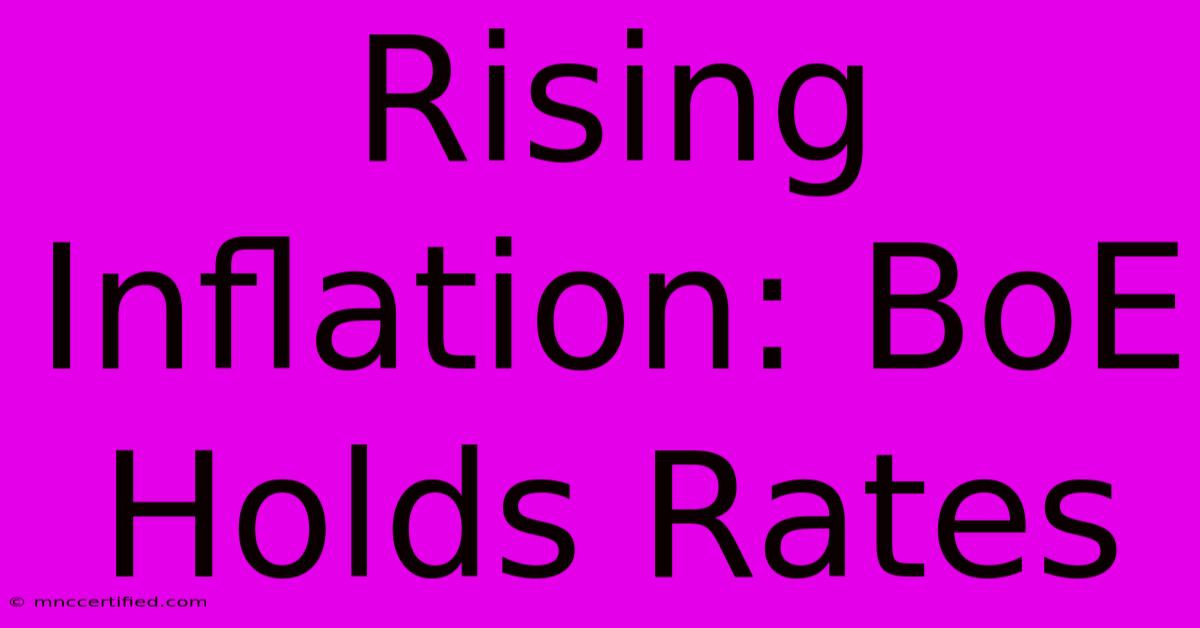Rising Inflation: BoE Holds Rates

Table of Contents
Rising Inflation: BoE Holds Rates – A Cautious Approach?
The Bank of England (BoE) recently made the surprising decision to hold interest rates, defying expectations of a further increase amidst stubbornly high inflation. This move has sparked considerable debate amongst economists and the public alike, prompting questions about the BoE's strategy and its potential impact on the UK economy. This article delves into the factors behind the decision, analyzes its implications, and explores potential future scenarios.
Understanding the Current Economic Climate
The UK, like many other countries, is grappling with persistent inflationary pressures. Inflation, currently hovering above the BoE's 2% target, remains a significant concern. Several factors contribute to this elevated inflation, including:
- Global energy prices: The ongoing energy crisis, exacerbated by the war in Ukraine, continues to drive up the cost of energy for households and businesses.
- Supply chain disruptions: Lingering supply chain bottlenecks, although easing, still contribute to increased prices for goods.
- Increased demand: Post-pandemic recovery has led to increased consumer spending, putting upward pressure on prices.
- Wage growth: While wages are rising, they are not keeping pace with inflation, squeezing household budgets.
These factors paint a complex economic picture, making the BoE's decision to hold interest rates all the more intriguing.
Why Did the BoE Hold Rates?
The BoE's Monetary Policy Committee (MPC) cited several reasons for its decision to maintain interest rates:
- Signs of slowing economic growth: Recent economic data suggests a potential slowdown in UK economic growth, raising concerns about the impact of further rate hikes. A recession, though not officially declared, is a significant risk.
- Lagging effects of previous rate increases: The BoE acknowledged that the full impact of previous interest rate increases is yet to be felt, suggesting that further tightening might be premature. This highlights the inherent time lag between policy changes and their effects on the economy.
- Uncertainty around the economic outlook: The global economic landscape remains uncertain, with various geopolitical risks and potential unforeseen economic shocks. This uncertainty makes it difficult to predict the optimal monetary policy response.
Implications of the Decision
The BoE's decision to hold rates has far-reaching implications:
- Potential for higher inflation: By not increasing interest rates, the BoE risks allowing inflation to remain elevated for longer. This could lead to further erosion of purchasing power for consumers.
- Easing pressure on borrowers: Maintaining interest rates at their current level offers some relief to borrowers, particularly those with variable-rate mortgages.
- Supporting economic growth (potentially): By avoiding further rate hikes, the BoE aims to avoid stifling economic growth, mitigating the risk of a deeper recession. However, this strategy also carries the risk of fueling inflation.
What's Next for the UK Economy?
The future trajectory of the UK economy remains uncertain. The BoE's decision represents a calculated risk, balancing the need to control inflation with the desire to avoid a sharp economic downturn. Several factors will determine the success of this strategy:
- The evolution of global energy prices: A significant decline in energy prices could ease inflationary pressures, making further rate hikes unnecessary.
- The strength of the UK labor market: A strong labor market could contribute to sustained consumer spending, potentially fueling further inflation.
- The effectiveness of government fiscal policy: Government policies aimed at supporting economic growth or mitigating inflationary pressures will play a crucial role.
The BoE will closely monitor these factors and adjust its monetary policy accordingly. Future rate decisions will likely depend on incoming economic data and the evolving economic outlook. The BoE's approach remains cautious, highlighting the delicate balancing act between controlling inflation and supporting economic growth.
SEO Considerations:
Keywords: Rising inflation, BoE, Bank of England, interest rates, monetary policy, UK economy, inflation rate, economic growth, recession, supply chain, energy prices, wage growth, MPC, monetary policy committee
On-Page SEO: Strategic use of keywords throughout the article, optimized title tag and meta description, use of header tags (H2, H3) for improved readability and structure.
Off-Page SEO: Promote the article through social media, link building (gaining backlinks from relevant websites), and engaging with relevant online communities. Consider guest posting on relevant blogs to expand reach.
This comprehensive article addresses the complexities surrounding the BoE's decision to hold interest rates, offering valuable insight into the current economic climate and potential future scenarios. By incorporating strong SEO techniques, this article aims to achieve high search engine rankings and engage a wide audience.

Thank you for visiting our website wich cover about Rising Inflation: BoE Holds Rates. We hope the information provided has been useful to you. Feel free to contact us if you have any questions or need further assistance. See you next time and dont miss to bookmark.
Featured Posts
-
Southampton 1 2 Liverpool Nunez Elliott Win
Dec 19, 2024
-
River Jump Controversy Jordan North Responds
Dec 19, 2024
-
Schwarzeneggers Santa Movie Release Date
Dec 19, 2024
-
Vick To Coach Norfolk Football
Dec 19, 2024
-
Intercontinental Cup Final Pachuca Wins
Dec 19, 2024